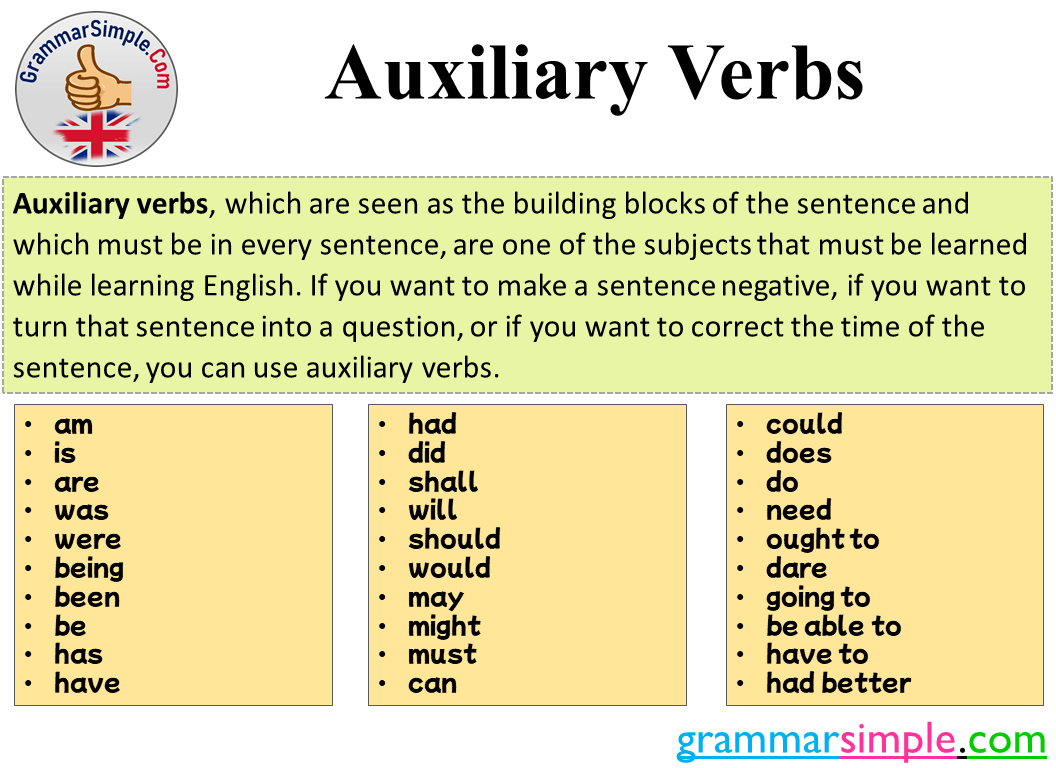What is Auxiliary Verb? Types of Auxiliary Verb and Modal Auxiliary Examples


What is Auxiliary Verb? Types of Auxiliary Verb and Modal Auxiliary Examples
Table of Contents
Auxiliary Verb
Auxiliary verbs, which are seen as the building blocks of the sentence and which must be in every sentence, are one of the subjects that must be learned while learning English. If you want to make a sentence negative, if you want to turn that sentence into a question, or if you want to correct the time of the sentence, you can use auxiliary verbs. All auxiliary verbs in English complement main verbs, but auxiliary verbs do not have any meaning if used alone, they are completely meaningless.
Here are +24 Auxiliary Verbs List, Modal Auxiliary List;
- am
- is
- are
- was
- were
- being
- been
- be
- has
- have
- had
- did
- shall
- will
- should
- would
- may
- might
- must
- can
- could
- does
- do
- need
- ought to
- dare
- going to
- be able to
- have to
- had better
What Are Auxiliary Verbs in English and What Are Their Meanings?
Auxiliary verbs in English are be, can, could, dare, do, have, may, might, must, shall, should, will, and would.
Auxiliary verb be
This auxiliary verb can be used in three different ways, the first use is as a connecting auxiliary verb. For example, “She is his wife.” or “I am your manager.” We can say the sentences. The second usage function of the auxiliary verb be is to help the present tense, “You are reading a book.” sentence is an example of this usage. In addition to these uses, the auxiliary verb be can also be used passively, that is, “She was seen you in the market yesterday.”
Auxiliary verb can
Can uses the auxiliary verb generally to mean being able to do something or about actions that something can do. For example, “You can graduate from this school.” and “Somethings can improve my knowledge.”
Auxiliary verb could
The use of the auxiliary verb could is the same as the auxiliary verb can, this auxiliary verb is the second form of the auxiliary verb can. So we can say that “You could graduate from this school.” and “Somethings could improve my knowledge.”
Auxiliary verb dare
This auxiliary verb is about whether individuals dare to do something. For example, we can say that “You cannot dare to compete with me.”
Auxiliary verb do
This auxiliary verb can be used to emphasize, ask questions and support a sentence. The two best examples we can give in this regard are “You do clean dishes.” and “Do you clean dishes?” are questions.
Auxiliary verb have
This auxiliary verb is used when making sentences with the perfect tense. For example, “They have been there.”
Auxiliary verbs may and might
These auxiliary verbs can be used interchangeably, and one use is to ask permission and the other to indicate that a situation may occur. We can say that “May/Might I give this gift to you?” is used to ask for permission, and “It might rain.”
Auxiliary verb must
The auxiliary verb must can be used when an event is not desired to occur, or it can be used to indicate a possibility. Examples of these uses are “You must not disturb me while I am studying.” and “She must have had the best grades.” We can give the sentences.
Auxiliary verb should
This auxiliary verb is used when something needs to be done or when something can happen. For example, “You should rest.” and “Medicines should help to make heal you.”
Recent Posts
Use Rose in a Sentence, How to Use Rose with Example Sentences
Use Rose in a Sentence, How to Use Rose with Example Sentences
Use Yourself in a Sentence, How to Use Yourself with Example Sentences
Use Yourself in a Sentence, How to Use Yourself with Example Sentences
Use Picture in a Sentence, How to Use Picture with Example Sentences
Use Picture in a Sentence, How to Use Picture with Example Sentences
Use Claim in a Sentence, How to Use Claim with Example Sentences
Use Claim in a Sentence, How to Use Claim with Example Sentences
Use Treasure in a Sentence, How to Use Treasure with Example Sentences
Use Treasure in a Sentence, How to Use Treasure with Example Sentences
Use Raise in a Sentence, How to Use Raise with Example Sentences
Use Raise in a Sentence, How to Use Raise with Example Sentences